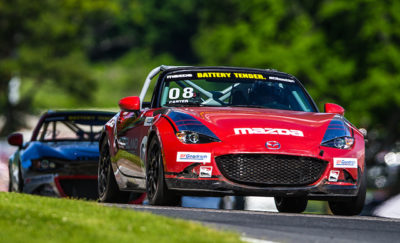Racing is a puzzle; it is about problem solving in real time.
Race teams and carmakers employ all available technologies; they find the best and brightest people to identify and analyze problems as they occur, and to develop and implement solutions in real time. In some series, the opportunity to change or impact the cars performance once the race has started is limited only to the driver as there are no (planned) pit stops. In other series, especially in endurance racing, the opportunity to change the strategy and performance of the car is ever-present and so the need to constantly evolve is always there. Beyond the actual racing (between the green flag and the checkered flag – the shortest part of any race program), the constant search for ingenious solutions is where competitive advantage is found.
In Mazda’s motorsports footprint, ingenious solutions are found not only in how cars are run, but how the business of motorsports is conducted. Certainly, Mazda’s support of grassroots racing in the U.S. is unique and ingenious. As the only automaker with a dedicated call center where grassroots and pro racers can easily access technical support and order parts directly from the Mazda Motorsports department, it is accessibility that makes going racing easier. Likewise, the Mazda Road to 24 (MRT24) driver development ladder system is a unique way to identify and financially support those drivers who have potential to advance their careers given the right opportunity. Many drivers over the past decade have benefited from this ingenious solution. Most recently, Jared Thomas parlayed his 2019 racing grassroots campaign into the MRT24 scholarship to compete in the 2020 Battery Tender Mazda MX-5 Cup presented by BFGoodrich® Tires. The previous MRT24 scholarship winner from the grassroots ranks – Michael Carter – proved his mettle by claiming the 2019 MX-5 Cup rookie of the year award valued at $75,000.
The MX-5 Cup car that Carter races and Thomas will race is also a product of ingenious and innovative thinking. When Mazda realized that the key to a successful and sustainable MX-5 Cup series was affordability, reliability, and parity among the cars, it chose to move to a one-builder model to ensure the highest standards possible. The parity that decision led to has created one of, if not the, closest road racing championship in the U.S. with a combined winning margin across 12 races in the 2019 series of 14.072 seconds, and just 4.89 seconds in 2018. The average winning margin across the 24 races of the last two seasons was a miniscule 0.79 seconds.
In racing at higher levels such as the IMSA WeatherTech Sportscar Championship, telemetry systems feed a constant stream of information so engineers can monitor and recommend changes. Three-dimensional stability control systems use the information to deliver optimal dynamic performance to the vehicle, just as similar systems do for street drivers. Powering Mazda’s RT24-P in that series is a 2.0L Turbo in line four-cylinder engine. It is the only four-cylinder engine in the class and has the smallest displacement. Yet, through ingenious solutions applied throughout the engine and cars systems, Mazda competes (and wins) against much larger V6- and V8-powered cars. So much so that at the 2019 Rolex24 at Daytona, the #77 Mazda RT24-P with its 2.0L i4 Turbo sat on the pole position, before both Mazda Team Joest cars recorded wins in the 2019 season in a stunning three in a row last summer.
KODO design is employed throughout Mazda motorsports programs. That i4 turbo engine architecture is shared with many of Mazda’s production vehicles. Mazda MX-5 Cup has provided learnings now deployed in production transmissions. Mazda production diesel engines benefited from race track learnings. Motorsports has always provided ingenious solutions to the automotive industry (e.g., rear view mirror, disc brakes). This continues with Mazda today.
Related stories:
Feel Alive
Challenger Spirit
Human Centricity – A Mazda Known By


 ACCESSIBILITY
ACCESSIBILITY